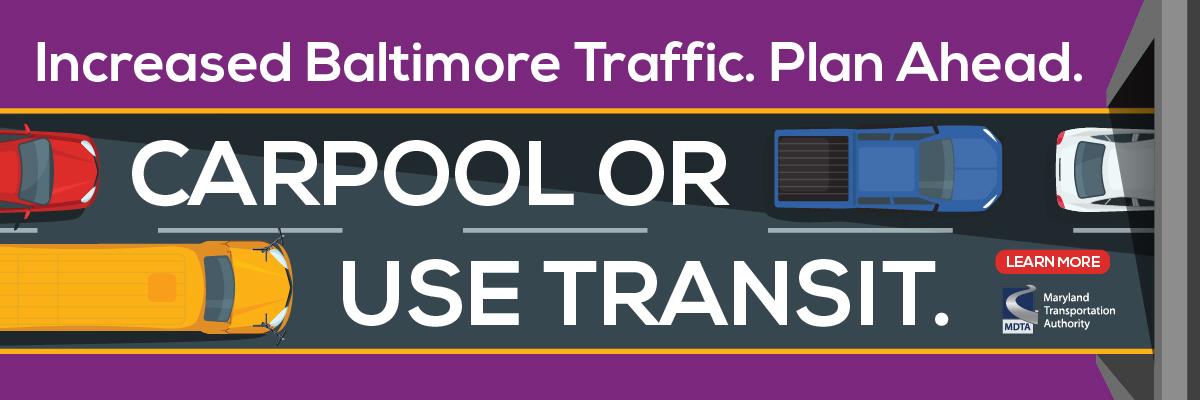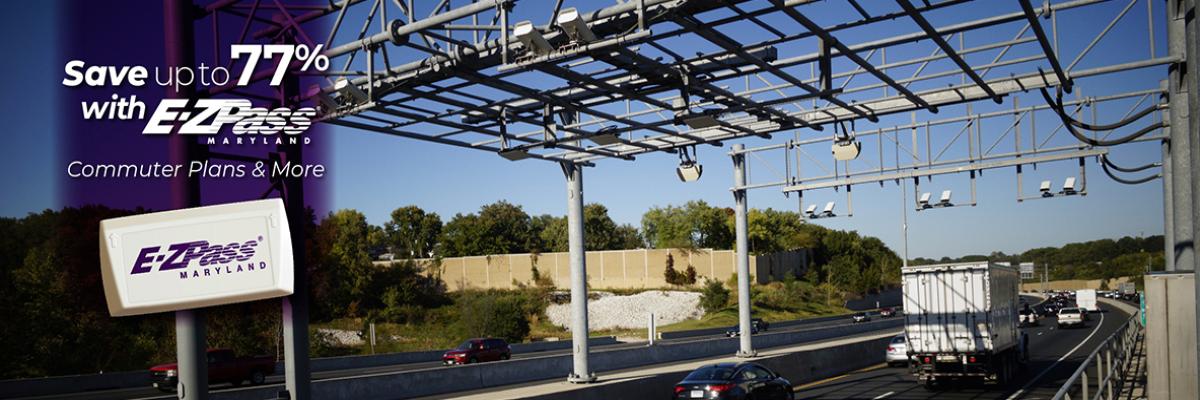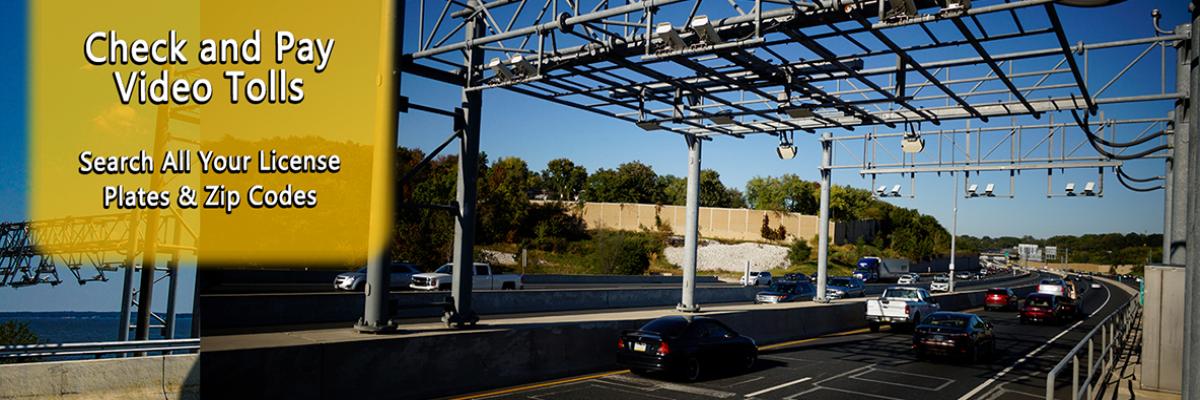FOR IMMEDIATE RELEASE
September 30, 2021
SECOND PUBLIC COMMENT PERIOD NOW OPEN
ON RECOMMENDED TOLL RATE RANGES FOR
PHASE 1 SOUTH: AMERICAN LEGION BRIDGE I-270 TO I-370
Public Comments Accepted Through 5 p.m. Thursday, October 28
The Maryland Transportation Authority (MDTA) today announced the opening of the second public comment period as part of the toll rate range setting process for proposed High Occupancy Toll (HOT) lanes for Phase 1 South: American Legion Bridge I-270 to I-370. The announcement follows the MDTA Board vote that establishes a four-week public comment period for the recommended toll rate ranges presented by MDTA staff during today’s livestreamed MDTA Board meeting.
Starting today, September 30, public comment is being accepted on the recommended action, which is available for review at mdta.maryland.gov/ALB270TollSetting. As part of the second comment period, written and voicemail comments will be accepted for the official record through 5 p.m. October 28. Those wishing to provide comments may:
- submit an electronic comment form at mdta.maryland.gov/ALB270TollSetting;
- download and email a completed comment form to [email protected];
- print and mail a completed comment form to Phase 1 South: American Legion Bridge I-270 to I-370 Toll Rate Range Public Comment, Maryland Transportation Authority, 2310 Broening Highway, Baltimore, MD 21224; or
- provide a single voicemail message 24/7, limited to three minutes, by calling 855-701-1977.
As a result of comments received during the first public comment period, which ran May 20 to August 14 and included in-person and virtual call-in public hearings, the recommended toll rate ranges reflect a new base minimum per-mile toll rate of 17 cents per mile, which is lower than the 20 cents per mile proposed in May. The 17 cents per mile recommendation is consistent with the base off-peak minimum per-mile toll rate for the MDTA’s Intercounty Connector (ICC)/MD 200.
Elements of the recommended toll rate ranges for public comment include:
- Minimum and Maximum Toll Rate Ranges: This is the lowest and highest per-mile toll rates that may be charged within any tolling segment. The minimum toll rate also refers to the lowest total toll (not per mile) that may be charged, regardless of how far a vehicle travels, to ensure short HOT lanes trips are charged a flat minimum toll to cover toll collection costs. There are no changes from the May 20 proposal to the maximum per-mile toll rates nor to the minimum toll rate (not per mile).
- Soft Rate Cap: A per-mile toll rate within each toll rate range that can only be exceeded if and when vehicle speed is reduced, or traffic volumes increase, to predetermined speed and throughput thresholds. The caps protect our customers by ensuring the Section Developer may only exceed a specific per-mile toll rate (within the approved ranges) for the impacted tolling segment as specified by predetermined thresholds. This will provide drivers choosing to use the HOT lanes a faster and more reliable trip. There are no changes from the May 20 proposal to the soft rate cap.
- Discounts: To provide opportunities for faster, more reliable carpooling, vanpooling and transit options, free passage will be granted in the HOT lanes for High Occupancy Vehicles (HOV) 3+ (all vehicles carrying three or more passengers) and buses, as well as for motorcycles. There are no changes from the May 20 proposal to the discounts.
- Escalation Factors: The approved toll rate ranges are intended for the duration of the Phase 1 South agreement. For the toll rates to effectively manage demand and ensure reliability for users of the HOT lanes into the future, the maximum toll rate range, soft rate cap and unregistered video surcharge will escalate over time to account for inflation, population employment and income growth. The minimum per-mile toll rate and minimum toll are subject to escalation for inflation only. There are no changes from the May 20 proposal to the escalation factors.
All comments received during the comment period will be given equal consideration. The MDTA encourages the public to review the toll rate range recommendation for Phase 1 South: American Legion Bridge I-270 to I-370 at mdta.maryland.gov/ALB270TollSetting prior to commenting.
In November, MDTA staff will post a summary and analysis of comments received during the second public comment period to MDTA’s web site. The summary also will be presented during a livestreamed MDTA Board meeting that will be open to the public. At this meeting, MDTA staff will present the final toll rate range recommendation to the Board. The Board will accept any additional public comment during the meeting prior to voting whether to approve the toll rate ranges. Information will be provided in future announcements on how to register to comment on the final toll rate range recommendation during the MDTA Board meeting.
The new Recommended Preferred Alternative (RPA) identified on May 12, 2021, by the Federal Highway Administration and the Maryland Department of Transportation State Highway Administration (MDOT SHA) for the Managed Lanes Study focuses solely on building a new American Legion Bridge and delivering two HOT lanes in each direction on Phase 1 South: American Legion Bridge I-270 to I-370, with no action at this time on I-495 east of the I‑270 eastern spur.
On I-495, the RPA consists of adding two new HOT managed lanes in each direction from the George Washington Memorial Parkway in Fairfax County, Va., to east of MD 187, Old Georgetown Road. On I-270, the RPA consists of converting the one existing HOV lane in each direction to a HOT managed lane and adding one new HOT managed lane in each direction on I-270 from I-495 to north of I-370, and on the I-270 east and west spurs.
Under the RPA, existing general-purpose travel lanes throughout the corridor would be retained and remain free for use by all motorists. HOV3+ would allow vehicles carrying three or more people to travel faster and more reliably in the new HOT lanes free of charge any time of day. Buses and motorcycles also would have free use of the new HOT lanes, providing opportunities for a faster, more-reliable trip. Drivers with less than three occupants in their vehicle could use the general purpose lanes free of charge, and would pay a toll only if they choose to use the HOT lanes.
The new RPA would address existing traffic and long-term traffic growth, enhance trip reliability, provide additional travel and transit options and improve the movement of goods and services between key economic centers in Maryland and Virginia. This alternative also will provide significant pedestrian and bicycle commitments to improve connectivity of area sidewalks and trails, including the addition of a multi-use trail on the new American Legion Bridge across the Potomac River.
More details on the new RPA can be found at https://oplanesmd.com/environmental/alternatives/rpa/.
If you are unable to access the materials online, or if you require special accommodations under the Americans with Disabilities Act or require language translation services (free of charge), please contact the MDTA’s Title VI Officer at [email protected] or at 410-537-6720.







